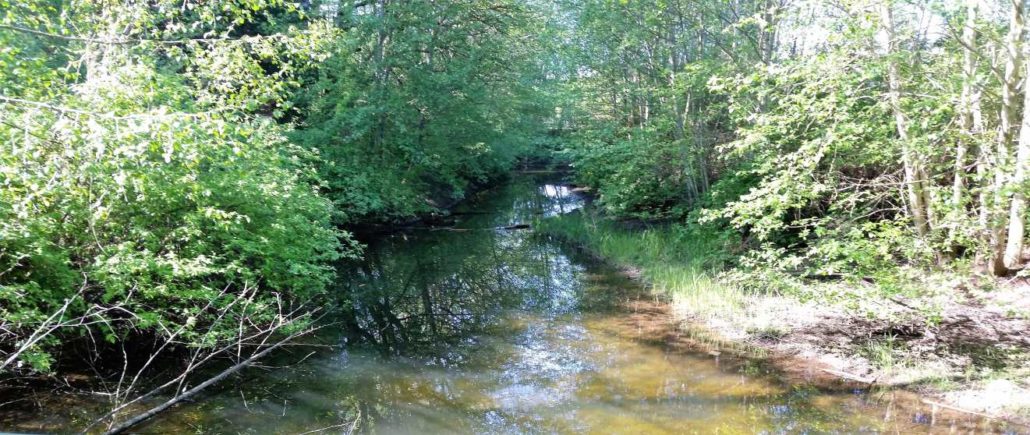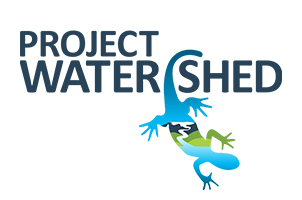Off channel Habitat at
Simms Millennium Park
It was used by species such as Coho salmon, however, it was not functioning as well as it could be. In order to access the pond habitat, fish had to pass through a long culvert which was perched high and only flowed when the river and/or tide was high. In addition, the pond was a dead-end with no connection back to the river. Fish that accessed the pond habitat were often trapped making them vulnerable to seal predation and in the summer the water became stagnant, too hot and low in oxygen, due to limited circulation.
Over 2017- 2018, the Project Watershed team completed a habitat improvement project. The endeavour included the removal of an old culvert connecting the Courtenay River through the park into an inner pond area. This culvert was replaced with a larger fish-friendly culvert installed at a lower elevation so that fish will have more access during a variety of tide cycles. In addition another large culvert was installed at the end of the inner pond connect through to the Courtenay Slough. This installation of the two culverts created a true flow-through channel and has completely changed the hydrology of the area, resulting in improved circulation and flushing which has led to better water quality. Immediately following the changes adult salmon and trout were observed moving through the new culverts and utilizing the channel.
As part of the project some Alder trees had to be removed and the area re-contoured to allow equipment access to the site other non native plants were also removed. These trees and were replaced with conifers and native plant and shrub species.
Volunteers from the community helped salvage fish from the area before the start of construction, and were also on hand to keep the public out of the active work zone during construction and explain the project objectives to those interested. The K’ómoks First Nation Guardian Watchman and their summer students helped with site preparation and the City of Courtenay Parks staff provided tremendous professional support throughout the project. Of course the project could not have been brought to fruition without the financial support of the Fish and Wildlife Compensation Program, Fisheries and Oceans Canada and the Habitat Conservation Trust Foundation.
Simms Millennium Park Habitat Enhancement
Park Information
Native Plants
Nature Viewing Guide
Signs of Abundance Tour
Heritage Value
Courtenay River
Simms Millennium Park

Simms Park Cleanup a Success
For the sixth year in a row Project Watershed has fielded an intrepid crew to brave the wilds of Simms Park and clean garbage from all its waterways and nooks and crannies. Recognizing BC Rivers Day, as well as the Great Canadian Shoreline Cleanup on Sunday, September...
The Puntledge Chinook Spawning Behaviour Study
(Click the box icon in the top right corner of the document to view full size.)
Puntledge Chinook & Coho Smolt Migration Study
(Click the box icon in the top right corner of the document to view full size.)
What Can I Do To Help?
Educate Yourself and Others
If you should come across any stream hosting a salmon run, please do not disturb or harass the fish or wildlife. These fish are a precious resource. The spawners are our assurance that salmon will frequent the stream for generations to come.
Other tips:
- Keep pets away from streams. Animal waste is polluting. Pets entering streams can erode stream banks and cause siltation; their activity also disturbs wildlife and salmon living in streams.
- Keep litter and trash out of streams. Besides being unsightly, trash will collect into debris jams and block water flow. Limit in-stream cleanup activity to the summer months.
- If you see any situation that may compromise the health of a stream contact the 24 hr Provincial Emergency Program at 1-800-663-3456.
Volunteer
We are often looking for extra hands to help with stewardship projects – from planting to invasive removal to education. To volunteer fill out our volunteer form we will contact you with dates and times our activities occur.
Donate
Check out our donate page to find the best way to contribute. We appreciate all donations as they help us o continue our stewardship work.

